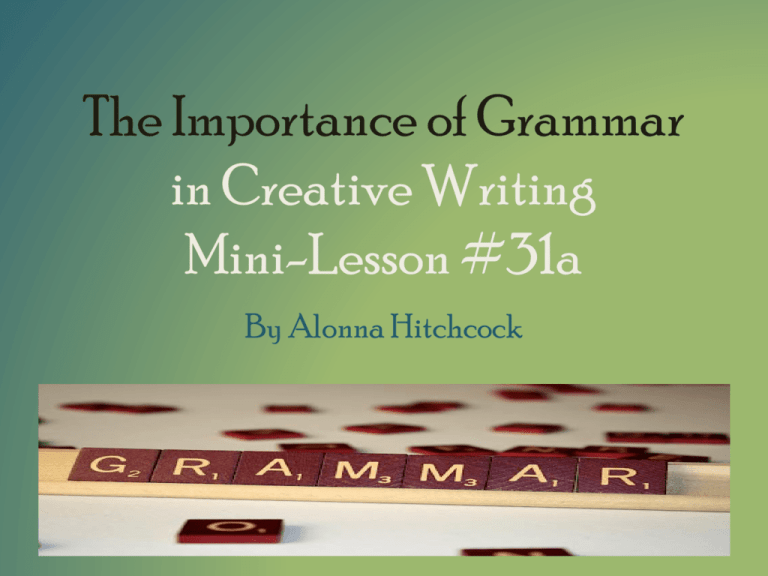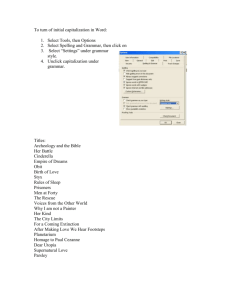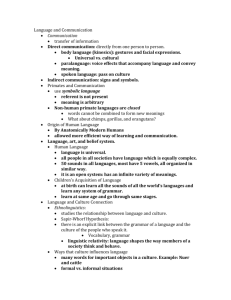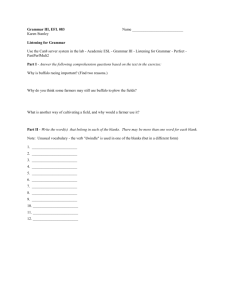6. Creative Writing
advertisement

The Importance of Grammar in Creative Writing Mini-Lesson #31a By Alonna Hitchcock Is proper grammar necessary for creative writing? Credibility/Acceptability Your grammar skills, or lack thereof, reflect your credibility, or lack thereof. If you want your work to be accepted by publishers and readers alike, your grammar must be up to par. “Most reputable publishers have enough submissions that they can toss grammatically weak work right into the trash can without thinking twice” (Donovan). People are often judged by the way they speak; authors are judged by the way they write. To gain trust from your readers, you must write with proper grammar. Communication When you write, you are communicating a specific message to your readers. Grammar is a tool that you can use to communicate your message properly. If your grammar is poor, you risk blurring your message. We need finite rules that allow an agreed upon meaning for grammar and punctuation, otherwise there would be Ch@Os, not communication. “Some musicians learn to play by ear and never bother to learn how to read music. Many of them don’t even know which notes and chords they’re playing, even though they can play recognizable songs. But get them in a room with other musicians, and they’ll quickly become isolated. You can’t engage with others in your profession if you don’t speak the language of your industry. Communicating with writers and editors becomes difficult if you don’t know the parts of speech, the names of punctuation marks, and all the other components of language and writing that are related to good grammar” (Donovan). Clarity/Readability You will not be there to answer your reader’s questions, so it is important that the message you are trying to communicate to your reader is clear. For your work to be clear and readable, you must use correct grammar. If your work is full of grammatical mistakes, your readers are going to have a hard time getting through it. Nothing is more distracting than being pulled out of a good story because a word is misspelled or a punctuation mark is misplaced. You should always respect your readers enough to deliver a product that is enjoyable and easy to understand (Donovan). Formatting When you answer the phone at work, do you say “Yo, wuz up?” Not unless you want to be fired. There is a protocol for how you must do certain things. Formatting is a writing guideline; in writing, formatting is a must. Formatting is another tool which can make your writing clearer and more readable. Standard Formatting Guidelines: 2” Spacing No extra spaces after paragraphs (unless a section break is needed) 12 point font 1” margins Centered title with name underneath Confusion He kissed my cheek and took my hand, we stood there watching Dawson slide over and over again every thirty seconds or so he would glance our way to make surely we were watching. The swings where near the slid so Mark and I walked over to them and each took a seat. We slowly start to swing and the metal creaked, I looked up at the sky just as the clouds floated in front of the sun. Mark and me swung for a while watching Dawson play and enjoy the cool breeze. We now had the park all to ourselves. “How has your day been so far?” Mark asked. I had a rough morning, but I am doing much better now. Dawson walked up to the swings, and climbed into the seat next to me “What made it better, besides seeing me?” Mark winked I laughed; “I just needed a little sunshine”. Dawson looked up at me and smile. “Momma, I your sunshine?” I smiled. “Yes baby you are my sunshine.” I stood up and pushed Dawson in the swing, as the sun pecked out from behind the clouds. Clarity He kissed my cheek and took my hand. We stood there watching Dawson slide over and over again. Every thirty seconds or so, he would glance our way to make sure we were watching. The swings were near the slide, so Mark and I walked over to them and each took a seat. We slowly started to swing, and the metal creaked. I looked up at the sky just as the clouds floated in front of the sun. Mark and I swung for a while, watching Dawson play and enjoying the cool breeze. We now had the park all to ourselves. “How has your day been so far?” Mark asked. “I had a rough morning, but I am doing much better now.” Dawson walked up to the swings and climbed into the seat next to me. “What made it better, besides seeing me?” Mark winked. I laughed. “I just needed a little sunshine.” Dawson looked up at me and smiled. “Momma, I your sunshine?” I smiled. “Yes, baby, you are my sunshine.” I stood up and pushed Dawson in the swing as the sun peeked out from behind the clouds. [Excerpt from “Sunshine” by Alonna Hitchcock] Stylistic Choice (Intentional Errors) Many authors purposely make errors in their writing for effect. The key word here is purposely. Famous authors such as Ernest Hemingway, Mark Twain, and William Faulkner have implemented intentional errors in their work as a stylistic choice. These authors did not carelessly write with poor grammar; they wrote with a specific style and purpose. Once you have mastered grammar, you can make stylistic choices with your writing. You must achieve credibility; otherwise, you will not be taken seriously. Publishers know the difference between careless mistakes and intentional errors. Mind your C’s Be clear! Clarity is necessary for your reader to interpret and understand your work. Be consistent! If you make intentional stylistic choices with format, punctuation, and grammar, be consistent. Be concise! Express your message clearly without “fluffing” your work. Your work should be comprehensive, not difficult to understand. Conclusion Grammar does play a vital role in creative writing. Proper grammar is necessary for credibility, readability, communication, and clarity. Mastering grammar will allow you as a writer to make your work clearer and more readable; you will also have the freedom of making stylistic choices. People will judge you based on your writing, so make sure your writing reflects you the way you want it to. An investment in grammar is an investment in yourself. If you want to be taken seriously as a writer, learn grammar. Using proper grammar in your writing will gain you respect and credibility. Be clear, consistent, and concise. Make a good impression, not a poor one. Works Cited Donovan, Melissa. "10 Reasons Writers Should Learn Good Grammar." Writing Forward. Web. 21 Oct. 2012. Thanks to Brad Barnes for being my sounding board and for giving me ideas and suggestions.








